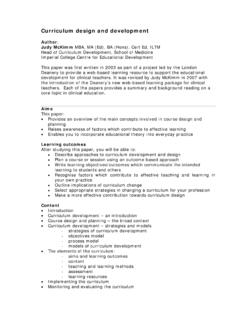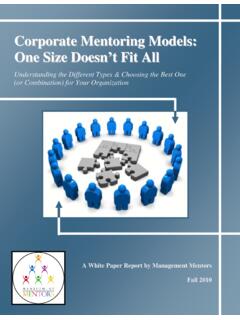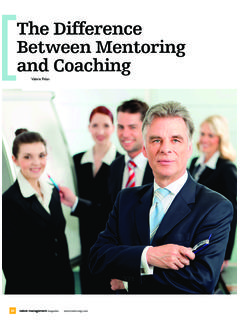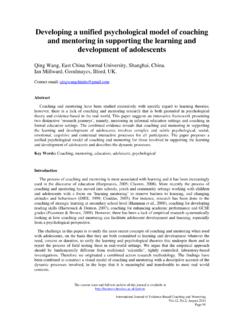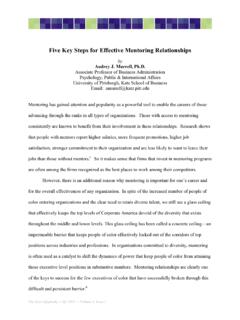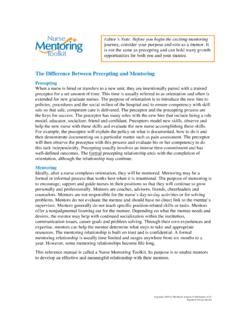Transcription of Mentoring: T heory and Practice - …
1 Developed from Preparedness to Practice , mentoring scheme July 1999. NHSE/Imperial College School of Medicine 1 mentoring : Theory and Practice Judy McKimm, Carol Jollie and Mark Hatter 2003, revised 2007 BACKGROUND This document formed part of a report produced by Mark Hatter, Carol Jollie and Judy McKimm in July 1999 as part of the Preparedness to Practice Project which was managed by Judy McKimm, then Director of the Undergraduate Medicine Office, Imperial College School of Medicine. The project ran from 1998 2001 and aimed to research into a number of aspects relating to students making the transition between the final year of the undergraduate course and the PRHO year. The project was funded by the London Regional Office of the NHSE.
2 The mentoring element of the project was carried out with a view to introducing a mentoring scheme which would enable final year undergraduates to make the transition to PRHOs. Following the literature review of mentoring and a pilot project, it was decided that the personal tutor system for undergraduates and the educational supervisor system for PRHOs provided sufficient support for students and PRHOs. This paper describes some of the theoretical perspectives and principles and Practice of mentoring , describes some mentoring schemes in medicine and other health professions and lists some of the key references in mentoring for those who are interested in learning more about the topic. The document was first revised in 2003 and included as part of the support materials for the London Deanery project: Web based learning for clinical teachers.
3 SECTION 1 mentoring : THEORY AND Practice WHAT IS mentoring ? mentoring is very complex. It varies from one situation to another. It is interpreted in different ways by different people. It is important that the purpose and intentions of mentoring in a particular context are explicit. Stakeholders, particularly mentor and mentee, should debate what mentoring is to be in their particular context in order that a mutual understanding and vision of mentoring can be shared as they embark on their relationship. mentoring is difficult to define. Many different definitions abound but two of particular merit have been selected here. Further definitions are included in Annex 1. mentoring is off line help by one person to another in making significant transitions in knowledge, work or thinking (Megginson and Clutterbuck, 1995, p13) A mentor is someone who helps another person to become what that person aspires to be (Montreal CEGEP, 1988) A mentor is therefore someone who helps another person through an important transition such as coping with a new situation like a new job or a major change in personal circumstances or in career development or personal growth.
4 The person being helped is often called the learner or the mentee . mentoring is only one form of support. Individuals may be supported in other ways, eg by colleagues (peer support), line managers, counsellors, tutors/teachers and groups, eg action learning groups or work teams, friends or parents. It is important to recognise that an individual may have a variety of support, for a variety of reasons, including more than one mentor, at any one time and that this mix of support may vary over a period of time. The traditional form of mentoring is one to one mentoring but there are other models of mentoring such as co mentoring or peer mentoring and group mentoring . mentoring can also be mentee initiated and can happen informally when an individual seeks advice and support from another individual.
5 Often people do not recognise that they have a mentor or have been mentoring . This kind of mentoring may occur within or outside an organisation. The terms Mentor and mentoring are becoming more common, even though they mean different things to different people. mentoring is just one way of helping someone else but it can be a veryDeveloped from Preparedness to Practice , mentoring scheme July 1999. NHSE/Imperial College School of Medicine 2 powerful and rewarding way, particularly in terms of learning. mentoring is a very old concept in a new guise. It can be traced back to Greek mythology when Odysseus entrusted his son Telemachus to the Goddess Athena, who disguised herself in human form as Mentor, an old friend of Odysseus.
6 Her function, according to Homer, was to act as a wise counsellor and helper to the youth. mentoring then became common Practice in the time of the guilds and trade apprenticeships when young people, having acquired technical skills, often benefited from the patronage of more experienced and established professionals. Today, for instance in the world of classical music, established stars encourage and nurture talented younger musicians both technically and in managing their careers, and most successful people, in any walk of life, probably have had one or more people over the years who have exerted a particularly strong influence over their lives and careers (Channel 4, 1995). WHY INTRODUCE mentoring ?
7 Entering Practice in any profession offers a major challenge to newly qualified practitioners. It is a formative period where the knowledge, skills and attitudes acquired during a programme of education are applied in Practice . It is a transition period which can be stressful as well as challenging as new demands are made upon individuals who are seeking to consolidate their skills. It is therefore a period when a practitioner is in need of guidance and support in order to develop confidence and competence. The concept of continuing support for a period after qualification through mentoring or other similar schemes is well established in many professions, such as teaching and social work and is being introduced by more and more organisations.
8 mentoring schemes can support: specifically identified groups development and work based learning programmes individuals or organisations through change or transition improved effectiveness of organisations and individuals Facilitated mentoring schemes may be introduced for a variety of reasons which may include the following (Jones & Jowett, 1997): to identify potential more effectively to induct new staff more quickly to improve the retention of staff to encourage and support high flyers to encourage and support ethnic minority and disadvantaged groups to encourage and support women to break through the glass ceiling to support self development and work based learning programmes such as NVQs, continuous professional development.
9 Graduate or company training programmes to encourage and support mentoring in community initiatives such as mentoring capable but disadvantaged school students to support organisational change to encourage personal development to help individuals cope with transitions such as moving into a new job or role. Some of the benefits of mentoring to the mentor, mentee and organisation are highlighted below:Developed from Preparedness to Practice , mentoring scheme July 1999. NHSE/Imperial College School of Medicine 3 Organisational Mentor Mentee/Learner Widening of skills base and competencies in line with the organisation s strategic goals Increased staff morale and job satisfaction Reduction in the service/education gap Alternative to external training.
10 More cost effective personal development programme Develops habits of trust and confidentiality Gives senior management a more informed view of the organisation talent Use for succession planning Helps achieve mission/vision Improves awareness of own learning gaps Develops ability to give and take criticism Develops up to date organisational and professional knowledge Offers networking opportunities Improves leadership, organisational and communication skills Develops ability to challenge, stimulate and reflect Raises profile within organisation Increases job satisfaction Offers opportunity to pass on knowledge, experience Provides stimulation Develops learning, analytical and reflective skills Develops organisational and professional knowledge Develops political awareness Develops own Practice Develops or reinforces self confidence and willingness to take risks Develops ability to accept criticism Supports through transition May accelerate professional development Develops autonomy and independence Increases maturity Broadens horizons Increases job satisfaction Reduces reality shock Offers opportunities for effective Develops a mature management population Improved quality of service through increased competence and confidence of supported practitioners Improves teamwork and co operation May offer career advancement


